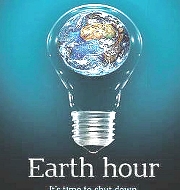Earth Hour observed across the World
The eleventh edition of the Earth Hour was observed across the world on 25 March 2017 to take a global call on climate change. To mark this day, cities worldwide turned their lights off from 8:30 pm to 9:30 pm local time.
This year millions of people from some 170 countries and territories had taken part in the annual event in a bid to highlight global warming caused by the burning of coal, oil and natural gas to drive cars and power plants.
Environmental activists this year also have focused to raise awareness on another problem that gets far less attention: Light Pollution.
About Earth Hour
- Earth Hour is an annual international event organised by the World Wide Fund for Nature (WWF). The first Earth Hour was held on March 31, 2007 in Sydney, Australia.
- It is held annually in end of March month to encourage everyone to turn off their non-essential lights for one hour, from 8:30 to 9:30 p.m.
- The event encourages households and businesses to turn off their lights and electrical appliances for one hour at the appointed time to raise awareness about the need to take action on climate change.
- Its goal is to raise awareness for sustainable energy use and create a more environmentally sustainable lifestyle.
- Since its inception, it has become annual global environmental event (movement). Now it has grown to engage more than 7,000 cities and towns across 172 countries worldwide.
What is Light Pollution?
Light pollution is artificial brightening of the night sky caused by man-made lightening sources, which has a disruptive effect on natural cycles and inhibits the observation of stars and planets. It is also known as photo pollution or luminous pollution and basically is the misdirected or obtrusive of natural light by excessive artificial light. More than 80% of humanity lives under skies saturated with artificial light.
Components of light pollution
- Glare: excessive brightness that causes visual discomfort.
- Skyglow: brightening of the night sky over inhabited areas.
- Clutter: bright, excessive and confusing groupings of light sources.
- Light trespass: light falling where it is not intended or needed.
Effects of Light Pollution
- Disturbs the reproductive cycles of some animals.
- Disturbs migration of birds that navigate using the stars and to disorient night-flying insects.
- In humans, it disturbs circadian rhythms that regulate hormones and other bodily functions.
- Excessive blue light emitted form LEDs directly affects sleep pattern in Human by suppressing the production of the hormone melatonin, which mediates the sleep-wake cycle in humans.
World Wide Fund for Nature (WWF): It is an international non-governmental organization (NGO) working in the field of the biodiversity conservation, and the reduction of humanity’s footprint on the environment.
Month: Current Affairs - March, 2017


